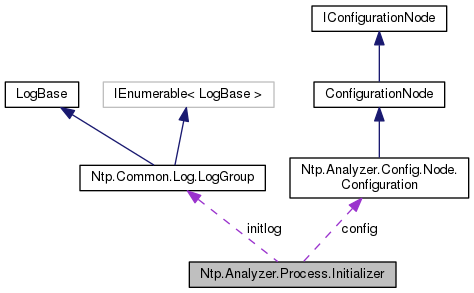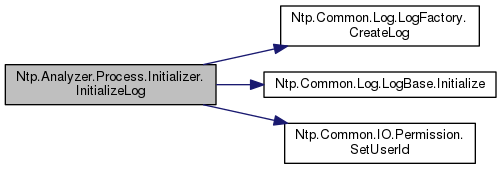|
NTP Analyzer
0.8.2
Analyze the operation of time servers
|
|
NTP Analyzer
0.8.2
Analyze the operation of time servers
|

Public Member Functions | |
| Initializer (string configFile, int pid, string pidFile, string name, LogGroup initlog) | |
| Initializes a new instance of the Initializer class. More... | |
| void | Run () |
| Run the NTP Analyzer. More... | |
Properties | |
| SignalHandler | Controller [get, private set] |
| List< Listener > | Listeners [get] |
| LogBase | Log [get, private set] |
| List< IRequest > | Nodes [get] |
| bool | Ready [get, private set] |
| Scheduler | Scheduler [get, private set] |
Private Member Functions | |
| void | InitializeApplication () |
| Initializes the application and database state. More... | |
| void | InitializeCluster () |
| Initializes the cluster nodes. More... | |
| bool | InitializeConfiguration () |
| Initializes the configuration. More... | |
| void | InitializeData () |
| bool | InitializeDatabase () |
| void | InitializeListeners () |
| Initializes the listeners. More... | |
| bool | InitializeLog () |
| Initializes the log. More... | |
| void | InitializeScheduler () |
| Initializes the scheduler. More... | |
| bool | InitializeSecurity () |
| Initializes the security settings. More... | |
Private Attributes | |
| Configuration | config |
| readonly string | configFile |
| readonly LogGroup | initlog |
| readonly string | name |
| readonly int | pid |
| readonly string | pidFile |
| readonly string | version |
Static Private Attributes | |
| static bool | firstrun = true |
Definition at line 50 of file Initializer.cs.
|
inline |
Initializes a new instance of the Initializer class.
| configFile | Config file to use. |
| pid | Process ID. |
| pidFile | Where to write Process ID file. |
| name | Name of process ID. Used when shutting down. |
| initlog | Log used during initialization. |
Definition at line 60 of file Initializer.cs.
References version.
|
inlineprivate |
Initializes the application and database state.
Definition at line 128 of file Initializer.cs.
References Ntp.Analyzer.Monitor.Server.ApplicationState.Config, Ntp.Analyzer.Monitor.Server.ApplicationState.ConfigFile, Ntp.Analyzer.Config.Node.Configuration.Heartbeat, Ntp.Analyzer.Monitor.Server.ApplicationState.Log, Ntp.Analyzer.Monitor.Server.ApplicationState.Name, Ntp.Analyzer.Monitor.Server.ApplicationState.Pid, Ntp.Analyzer.Config.Node.HeartbeatConfiguration.Rate, version, and Ntp.Analyzer.Monitor.Server.ApplicationState.Version.
|
inlineprivate |
Initializes the cluster nodes.
Definition at line 152 of file Initializer.cs.
References Ntp.Analyzer.Config.Node.Configuration.Cluster, e, and Ntp.Analyzer.Config.Node.ClusterConfiguration.Nodes.
|
inlineprivate |
Initializes the configuration.
Definition at line 176 of file Initializer.cs.
References Ntp.Common.Log.File.
|
inlineprivate |
Definition at line 194 of file Initializer.cs.
References Ntp.Analyzer.Data.DataFace.AssociationEntries, Ntp.Analyzer.Import.ImportFactory.CreatePeerImporter(), Ntp.Analyzer.Config.Node.Configuration.Database, e, Ntp.Analyzer.Data.DataFace.Hosts, Ntp.Analyzer.Config.Node.DatabaseConfiguration.Import, Ntp.Analyzer.Data.Import.TimeServerWebAdapter.Initialize(), Ntp.Analyzer.Config.Node.DatabaseConfiguration.Initialize, Ntp.Analyzer.Data.DataFace.Instance, Ntp.Analyzer.Data.Import.TimeServers.List, Ntp.Analyzer.Data.DataFace.Peers, Ntp.Analyzer.Data.DataFace.Servers, and Ntp.Analyzer.Config.Node.Configuration.Servers.

|
inlineprivate |
Definition at line 311 of file Initializer.cs.
References Ntp.Analyzer.Config.Node.Configuration.Database, e, Ntp.Data.Provider.SqlDatabaseFactory.Initialize(), Ntp.Analyzer.Config.Node.DatabaseConfiguration.Initialize, Ntp.Analyzer.Data.DataFace.Initialize(), Ntp.Data.Provider.SqlDatabaseFactory.Instance, and Ntp.Analyzer.Config.Node.DatabaseConfiguration.Upgrade.

|
inlineprivate |
Initializes the listeners.
Definition at line 342 of file Initializer.cs.
References e, and Ntp.Analyzer.Config.Node.Configuration.Monitors.
|
inlineprivate |
Initializes the log.
Definition at line 363 of file Initializer.cs.
References Ntp.Analyzer.Config.Node.PermissionConfiguration.AppUserId, Ntp.Common.Log.LogFactory.CreateLog(), e, Ntp.Common.Log.LogBase.Initialize(), Ntp.Analyzer.Config.Node.Configuration.Log, Ntp.Analyzer.Config.Node.Configuration.Permission, and Ntp.Common.IO.Permission.SetUserId().

|
inlineprivate |
Initializes the scheduler.
Definition at line 397 of file Initializer.cs.
References Ntp.Common.Process.Scheduler.Add(), Ntp.Analyzer.Config.Node.Configuration.Bulks, e, Ntp.Common.Process.Scheduler.Log, Ntp.Analyzer.Config.Node.Configuration.Notify, Ntp.Common.Process.Job.Reset(), Ntp.Analyzer.Monitor.Server.ApplicationState.Scheduler, Ntp.Analyzer.Config.Node.Configuration.Servers, Ntp.Common.Process.Scheduler.StartTime, and Ntp.Analyzer.Monitor.Server.ApplicationState.StartupTime.

|
inlineprivate |
Initializes the security settings.
Definition at line 462 of file Initializer.cs.
References Ntp.Analyzer.Config.Node.PermissionConfiguration.AppUserId, e, Ntp.Common.Log.File, Ntp.Analyzer.Export.FileSystemDestination.FileGroupId, Ntp.Analyzer.Export.FileSystemDestination.FileMask, Ntp.Analyzer.Config.Node.PermissionConfiguration.FileMode, Ntp.Analyzer.Export.FileSystemDestination.FileUserId, Ntp.Analyzer.Config.Node.PermissionConfiguration.GroupId, Ntp.Analyzer.Config.Node.Configuration.Permission, Ntp.Common.IO.Permission.SetUserId(), and Ntp.Analyzer.Config.Node.PermissionConfiguration.UserId.

|
inline |
Run the NTP Analyzer.
Definition at line 96 of file Initializer.cs.
|
private |
Definition at line 79 of file Initializer.cs.
|
private |
Definition at line 73 of file Initializer.cs.
|
staticprivate |
Definition at line 72 of file Initializer.cs.
|
private |
Definition at line 74 of file Initializer.cs.
|
private |
Definition at line 75 of file Initializer.cs.
|
private |
Definition at line 76 of file Initializer.cs.
|
private |
Definition at line 77 of file Initializer.cs.
|
private |
Definition at line 78 of file Initializer.cs.
|
getprivate set |
Definition at line 81 of file Initializer.cs.
|
get |
Definition at line 89 of file Initializer.cs.
|
getprivate set |
Definition at line 85 of file Initializer.cs.
|
get |
Definition at line 87 of file Initializer.cs.
|
getprivate set |
Definition at line 91 of file Initializer.cs.
|
getprivate set |
Definition at line 83 of file Initializer.cs.